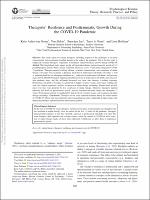Please use this identifier to cite or link to this item:
https://hdl.handle.net/20.500.12202/9321| Title: | Therapists’ resilience and posttraumatic growth during the COVID-19 pandemic |
| Authors: | Aafjes-Van Doorn, Katie Béké, Vera Luo, Xiaochen Prout, Tracy A. Hoffman, Leon 0000-0003-2584-5897 |
| Keywords: | online therapy therapists resilience posttraumatic growth COVID-19 |
| Issue Date: | 2021 |
| Publisher: | APA : American Psychological Association |
| Citation: | Aafjes-Van Doorn, K., Békés, V., Luo, X., Prout, T. A., & Hoffman, L. (2021). Therapists’ resilience and posttraumatic growth duriPsychological Trauma: Theory, Research, Practice and Policy,ng the COVID-19 pandemic. Psychological Trauma: Theory, Research, Practice and Policy, 14, 1942-9681. https://doi.org/10.1037/tra0001097 |
| Series/Report no.: | Psychological Trauma: Theory, Research, Practice and Policy;14 |
| Abstract: | Abstract ¶ _Objective_: This study aimed to examine therapists’ unfolding response to the challenges of vicarious traumatization and transitioning to online therapy in the wake of the pandemic. This is the first study to empirically examine therapists’ experience of resilience and posttraumatic growth during COVID-19. _Method_: This longitudinal study reports on the self-reported resilience and posttraumatic growth of 185 psychotherapists (mostly White, female and North American) across 4 time points during the COVID-19 pandemic. Therapist-reported working alliance, vicarious traumatization, and acceptance of online therapy at baseline were examined as potential predictors of professional self-doubt at baseline as well as potential predictors of subsequent resilience (e.g., reduction of professional self-doubt) and posttraumatic growth. _Results_:Therapists experienced moderate levels of professional self-doubt, more than outside pandemic times, and this self-doubt decreased over time, thus showing a resilient trajectory. Professional self-doubt at baseline was predicted by higher vicarious trauma and weaker working alliance, less clinical experience, and less acceptance of online therapy technology. Higher levels of resilience over time were predicted by less acceptance of online therapy. Moreover, therapists reported relatively low levels of posttraumatic growth, and this remained consistent during the subsequent 12 weeks. Posttraumatic growth was predicted by high levels of vicarious trauma, and acceptance of online therapy technology. _Conclusions_: Therapists in our study reported resilience during the initial months of COVID-19. Those who were relatively more traumatized and more comfortable in their online work during the pandemic experienced more posttraumatic growth. |
| Description: | Scholarly article / Open access |
| URI: | https://psycnet.apa.org/fulltext/2021-79893-001.html https://hdl.handle.net/20.500.12202/9321 |
| ISSN: | ISSN: 1942-9681, 1942-969X |
| Appears in Collections: | Ferkauf Graduate School of Psychology: Faculty Publications |
Files in This Item:
| File | Description | Size | Format | |
|---|---|---|---|---|
| AAfjes-Van Doorn Therapists' 2021.pdf | 225.99 kB | Adobe PDF |  View/Open |
This item is licensed under a Creative Commons License

